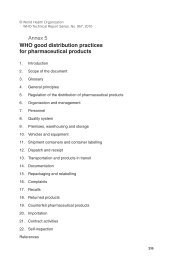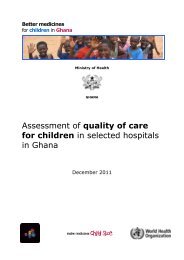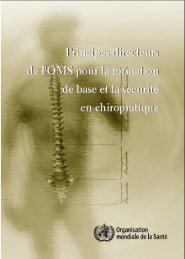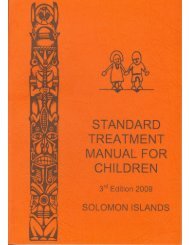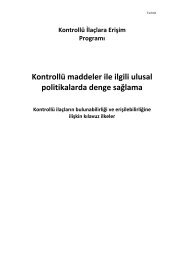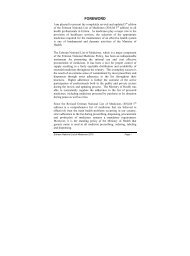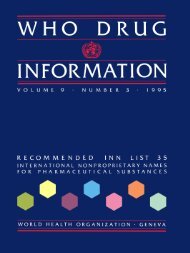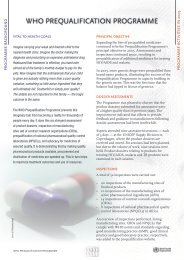WHO Drug Information Vol. 20, No. 1, 2006 - World Health ...
WHO Drug Information Vol. 20, No. 1, 2006 - World Health ...
WHO Drug Information Vol. 20, No. 1, 2006 - World Health ...
You also want an ePaper? Increase the reach of your titles
YUMPU automatically turns print PDFs into web optimized ePapers that Google loves.
Safety and Efficacy Issues<strong>WHO</strong> <strong>Drug</strong> <strong>Information</strong> <strong>Vol</strong> <strong>20</strong>, <strong>No</strong>. 1, <strong>20</strong>06• Patients who are immunocompromised shouldnot be prescribed pimecrolimus or tacrolimus.References1. FDA Paediatric Advisory Committee Meeting. http://www.fda.gov/ohrms/dockets/ac/05/briefing/<strong>20</strong>05-4089b2.htm2. FDA Talk Paper on Elidel® and Protopic®. http://www.fda.gov/bbs/topics/ANSWERS/<strong>20</strong>05/ANS01343.html3. HSA Product Safety Alert. 12 December <strong>20</strong>05.http://www.hsa.gov.sg/cda/safetyalertsTelithromycin: serious liver toxicityUnited States of America — An article reportingthree patients who experienced serious livertoxicity following administration of telithromycin(Ketek®) has recently been published. The caseshave also been reported to the Food and <strong>Drug</strong>Administration (FDA).FDA is continuing its investigation of this issue,and is providing the following recommendations tohealthcare providers and patients:• <strong>Health</strong>care providers should monitor patientstaking telithromycin for signs or symptoms ofliver problems. Telithromycin should be stoppedin patients who develop signs or symptoms ofliver problems.• Patients who have been prescribed telithromycinand are not experiencing side effects such asjaundice should continue taking their medicineas prescribed unless otherwise directed by theirhealthcare provider.• Patients who notice any yellowing of their eyesor skin or other problems like blurry visionshould contact their healthcare provider immediately.• As with all antibiotics, telithromycin should onlybe used for infections caused by a susceptiblemicroorganism. Telithromycin is not effective intreating viral infections, so a patient with a viralinfection should not receive telithromycin sincethey would be exposed to the risk of side effectswithout any benefit.A case review of the reports shows seriousadverse events following administration oftelithromycin. All three patients developedjaundice and abnormal liver function. One patientrecovered, one required a transplant, and onedied. When the livers of the latter two patientswere examined in the laboratory, they showedmassive tissue death. These two patients hadreported some alcohol use. All three patients hadpreviously been healthy and were not using otherprescription drugs. The FDA is also aware thatthese patients were all treated by physicians inthe same geographic area. The significance ofthis observation is not clear at the present time.In pre-marketing clinical studies, including a largesafety trial and data from other countries, theoccurrence of liver problems was infrequent andusually reversible. Based on the pre-marketingclinical data, it appeared that the risk of liver injurywith telithromycin was similar to that of othermarketed antibiotics. <strong>No</strong>netheless, the productlabel advises doctors about the potential for liverrelatedadverse events associated with the use oftelithromycin.Telithromycin is an antibiotic of the ketolide class.It was the first antibiotic of this class to be approvedby the FDA in April, <strong>20</strong>04 for the treatmentof respiratory infections in adults caused byseveral types of susceptible microorganismsincluding Streptococcus pneumoniae andHaemophilus influenzae.Reference.1. FDA Public <strong>Health</strong> Advisory. <strong>20</strong> January <strong>20</strong>06. http://www.fda.gov/medwatch/2. Clay, K.D., Hanson, J.S., Pope, S.D. Brief communication:severe hepatotoxicity of telithromycim: threecase reports and literature review. Annals of InternalMedicine (on-line edition), January <strong>20</strong>, <strong>20</strong>06, http://www.acponline.orgDeaths with galantamine in mildcognitive impairment studiesAustralia — Galantamine (Reminyl®), donepezil(Aricept®) and rivastigmine (Exelon®) areapproved for the treatment of mild to moderatelysevere Alzheimer dementia. Cardiac arrhythmiaswith these cholinesterase inhibitors have beenreported (1).Galantamine has also been investigated inpatients with mild cognitive impairment, anindication which is not approved in Australia. Intwo placebo controlled trials, there was a highermortality with galantamine than placebo, andgalantamine was not effective (2). The deaths14




